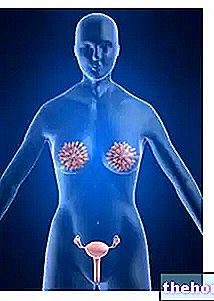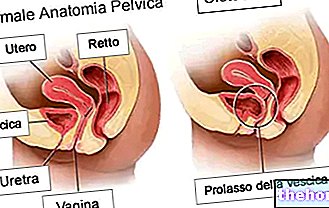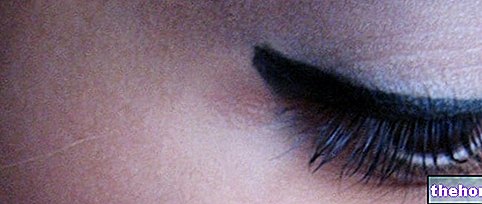"Introduction: the premenstrual syndrome
The demonstration that ovarian hormones can influence the activity of endogenous opioids represents the link between cyclical changes in ovarian activity and the various alterations in mood, behavior, appetite and intestinal functions typical of PMS, in turn more or less directly modulated by the endogenous opioids themselves.
The variations in the concentrations of endogenous opioids and the rapidity with which they disappear, together with various environmental factors, may explain the differences found in the severity of PMS symptoms from one patient to another.
Finally, the observation of a decrease in its levels in the blood during the luteal phase and the evidence of its relationship with depression, has led some to advance the hypothesis that PMS may be due to a reduction in serotonin levels. Although the use of drugs with the same function as serotonin or inhibitors of its reabsorption have shown some benefit in women with PMS, the precise mechanism by which the serotonin deficiency may contribute to its occurrence remains completely unknown. .
In conclusion, whatever its cause, there is a clear need to link PMS symptoms to hormonal fluctuations in the menstrual cycle. Indeed :
- The premenstrual syndrome does not appear before the activation of puberty, when the production of hormones by the ovaries does not yet occur;
- Mid-cycle symptoms are closely related to hormonal spikes;
- PMS disappears both during short anovulatory periods (without ovulation), during longer intervals of amenorrhea (lack of menstruation), and during pregnancy;
- PMS does not go away after hysterectomy (removal of the uterus) if the ovaries are preserved;
- Medical and surgical therapies that suppress ovarian function eliminate PMS.
Quite recently, a new hypothesis has been advanced according to which women with PMS differ from others in the metabolism of progesterone. More precisely, they have lower blood levels of allopregnenolone in the luteal phase of the cycle. The nerve cells of women with PMS preferentially transform the progesterone produced by the corpus luteum into pregnenolone, a hormone that increases anxiety, rather than allopregnenolone, which instead has a calming effect. If this hypothesis is correct, it is logical to imagine that the Administration of progesterone to women with PMS may aggravate their symptoms by providing greater amounts of substrate to be metabolized to pregnenolone.
It is not possible today to know with certainty why some patients develop PMS and others do not, but the factors related to heredity and lifestyle capable of influencing the neuroendocrine system (nervous and endocrine) are certainly very important. also that PMS is not a single disorder but rather a collection of different problems.
Therapy
For further information: Useful drugs against Premenstrual Syndrome
Given the variety of theories, the proposed treatments are very numerous and different from each other.
Progesterone and progestogens, vitamin B6, diuretics, were in the past among the most frequently used drugs. In cases where the woman does not want children and there are no contraindications, the contraceptive pill is also used, sometimes with success, in particular the one with high doses of progesterone, contained above all in the triphasic pills.
However, it should be remembered that the pill can also cause symptoms to worsen.
In patients with accentuated mastodynia (breast pain) there are advantages by administering 1 milligram of cabergoline (dostinex) per week to reduce the levels of prolactin (responsible for breast pain and tenderness) or 2.5-5 milligrams of bromocriptine (also " it inhibits prolactin levels), controlling its tolerance, or a topical therapy with progesterone gel.
If edema, swelling and water retention prevail, spironolactone (a diuretic antiandrogen that reduces testosterone levels) can be used which has the advantage, compared to other diuretics, of avoiding excessive potassium losses. prostaglandin inhibitors (the common anti-inflammatory drugs) can relieve pelvic pain, headache and diarrhea.
Quite recently, with the emergence of the theory according to which premenstrual syndrome is due to an alteration of the normal cyclical modifications of the activities of endogenous opioids during the luteal phase, new treatments have been proposed, in particular consisting of hormones that have a suppressing effect on ovary function.
In any case, it is necessary to carefully evaluate the risk and the benefit that each pharmacological treatment can entail and it must be borne in mind that in many of these patients there is a bad tolerance of almost all therapies, so the best thing is to try to eliminate the psychological mechanisms that favor or complicate the syndrome.
Surgical intervention
Finally, for patients who complain of very severe symptoms and who do not respond to any type of medical treatment, there are those who propose the surgical removal of the ovaries in laparoscopy, provided that the patient no longer wants children.
Diet and phytotherapy
For further information: Premenstrual Syndrome Remedies - Diet and premenstrual syndrome
Sometimes it is also useful to optimize the patient's diet by eliminating caffeine, decreasing the intake of sodium chloride (salt) in the week preceding menstruation, resorting to small meals several times a day supplemented with vitamins, calcium and minerals, in particular magnesium, which seems to have a "mildly antidepressant action, limiting itself, from a pharmacological point of view, and only for severe symptoms, to administering small doses of tranquilizers or antidepressants (Prozac, Xanax), or diuretics that cause a low loss of potassium .
For further information: Magnesium and Premenstrual Syndrome
Among the non-pharmacological treatments, appropriate for mild forms of PMS, we can mention: the intake of carbohydrate-rich (sugary) drinks in the late luteal phase of the cycle, physical exercise, behavioral therapies, autogenic training, biofeed- back etc.
Homeopathic doctors also recommend taking an Agnocasto-based preparation in the week preceding the menstrual cycle.
For further information: Menstrual Syndrome and Phytotherapy
Other articles on "Premenstrual Syndrome: Cures"
- Premenstrual syndrome
- Premenstrual Syndrome - Useful drugs against Premenstrual Syndrome
- Nutrition and premenstrual syndrome
- Diet and premenstrual syndrome
- Premenstrual Syndrome - Herbal Medicine



























